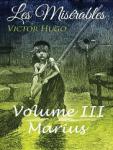Book 8 - The Wicked Poor Man
Chapter 22 - The Little One Who Was Crying In Volume Two
On the day following that on which these events took place in the house on the Boulevard de l'Hopital, a child, who seemed to be coming from the direction of the bridge of Austerlitz, was ascending the side-alley on the right in the direction of the Barriere de Fontainebleau.
Night had fully come.
This lad was pale, thin, clad in rags, with linen trousers in the month of February, and was singing at the top of his voice.
At the corner of the Rue du Petit-Banquier, a bent old woman was rummaging in a heap of refuse by the light of a street lantern; the child jostled her as he passed, then recoiled, exclaiming:--
"Hello! And I took it for an enormous, enormous dog!"
He pronounced the word enormous the second time with a jeering swell of the voice which might be tolerably well represented by capitals: "an enormous, ENORMOUS dog."
The old woman straightened herself up in a fury.
"Nasty brat!" she grumbled. "If I hadn't been bending over, I know well where I would have planted my foot on you."
The boy was already far away.
"Kisss! kisss!" he cried. "After that, I don't think I was mistaken!"
The old woman, choking with indignation, now rose completely upright, and the red gleam of the lantern fully lighted up her livid face, all hollowed into angles and wrinkles, with crow's-feet meeting the corners of her mouth.
Her body was lost in the darkness, and only her head was visible. One would have pronounced her a mask of Decrepitude carved out by a light from the night.
The boy surveyed her.
"Madame," said he, "does not possess that style of beauty which pleases me."
He then pursued his road, and resumed his song:--
"Le roi Coupdesabot S'en allait a la chasse, A la chasse aux corbeaux--"
At the end of these three lines he paused. He had arrived in front of No. 50-52, and finding the door fastened, he began to assault it with resounding and heroic kicks, which betrayed rather the man's shoes that he was wearing than the child's feet which he owned.
In the meanwhile, the very old woman whom he had encountered at the corner of the Rue du Petit-Banquier hastened up behind him, uttering clamorous cries and indulging in lavish and exaggerated gestures.
"What's this? What's this? Lord God! He's battering the door down! He's knocking the house down."
The kicks continued.
The old woman strained her lungs.
"Is that the way buildings are treated nowadays?"
All at once she paused.
She had recognized the gamin.
"What! so it's that imp!"
"Why, it's the old lady," said the lad. "Good day, Bougonmuche. I have come to see my ancestors."
The old woman retorted with a composite grimace, and a wonderful improvisation of hatred taking advantage of feebleness and ugliness, which was, unfortunately, wasted in the dark:--
"There's no one here."
"Bah!" retorted the boy, "where's my father?"
"At La Force."
"Come, now! And my mother?"
"At Saint-Lazare."
"Well! And my sisters?"
"At the Madelonettes."
The lad scratched his head behind his ear, stared at Ma'am Bougon, and said:--
"Ah!"
Then he executed a pirouette on his heel; a moment later, the old woman, who had remained on the door-step, heard him singing in his clear, young voice, as he plunged under the black elm-trees, in the wintry wind:--
"Le roi Coupdesabot[1] S'en allait a la chasse, A la chasse aux corbeaux, Monte sur deux echasses. Quand on passait dessous, On lui payait deux sous."
Footnote:
